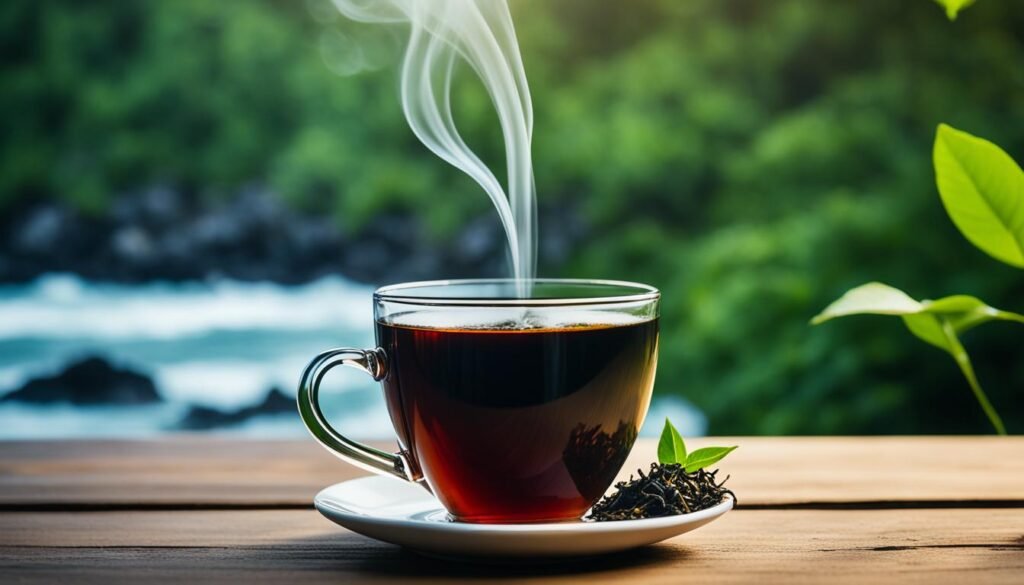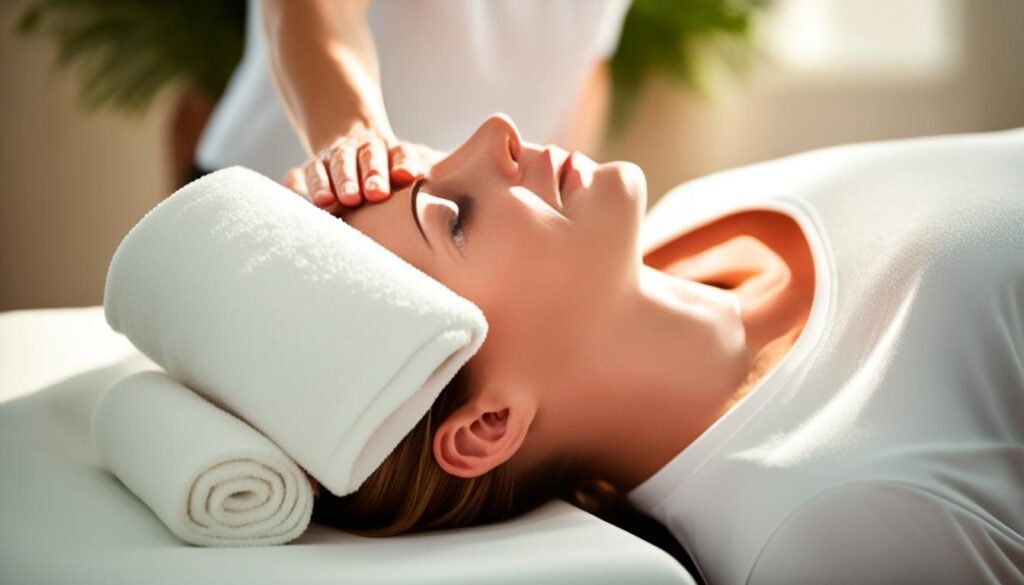Did you know that stress can wreak havoc on your skin and accelerate the aging process? When we’re stressed, our bodies release hormones like cortisol, which can cause inflammation, break down collagen, and lead to thinning skin, fine lines, and dryness. The good news is that there are effective strategies to manage stress and maintain a youthful complexion. In this article, I will explore 10 proven techniques to help you control stress and protect your skin.
Key Takeaways:
- Stress triggers hormone release, like cortisol, that can negatively affect your skin.
- Reducing stress levels can help maintain a more youthful complexion.
- Implementing strategies like drinking black tea, spending time in nature, listening to music, and practicing meditation can effectively control stress.
- Include stress-busting superfoods in your diet to combat stress and promote healthier skin.
- Expressing emotions and prioritizing self-care are essential for managing stress and achieving a youthful glow.
The Impact of Stress on Skin Health
Stress can have a significant impact on the health and appearance of our skin. It can accelerate the aging process, leading to premature skin aging. Understanding the effects of stress on the skin is crucial for developing effective strategies to manage stress and maintain skin health.
Shortened Telomeres and Thinning Skin
One way that stress affects the skin is by shortening telomeres, which are protective DNA caps at the ends of chromosomes. When telomeres shorten, the skin becomes thinner, and collagen and elastin fibers decrease. This results in a loss of firmness and elasticity, leading to the formation of fine lines and wrinkles.
Compromised Skin Barrier and Dryness
Stress can also compromise the skin barrier, leading to dryness and visible signs of aging. When the skin barrier is compromised, it becomes more prone to moisture loss, resulting in dry and dehydrated skin. This can exacerbate the appearance of lines and wrinkles, making the skin look aged and dull.
Oxidative Stress and Skin Damage
Increased stress levels can trigger oxidative stress, which damages the skin cells and accelerates aging. Oxidative stress leads to the formation of pigmented spots, uneven skin tone, and the breakdown of collagen and elastin fibers. This can result in the development of wrinkles, sagging skin, and a loss of youthful radiance.
Glycation and Loss of Skin Elasticity
Stress can also trigger a process called glycation, where sugar molecules bind to proteins in the skin. This results in the formation of advanced glycation end products (AGEs) that affect the structure of the skin. Glycation leads to a loss of skin elasticity, causing the skin to appear dull and saggy.
It is evident that stress has a profound impact on skin health, contributing to premature skin aging. By understanding the mechanisms through which stress affects the skin, we can develop effective stress management strategies to promote healthier, more youthful-looking skin.
The Benefits of Black Tea

Drinking black tea has been shown to have calming effects on the body. People who regularly consume black tea experienced a 47% drop in cortisol levels after a stressful task, compared to a 27% drop in those who didn’t drink tea.
The polyphenols and flavonoids found in black tea are believed to be responsible for its stress-reducing properties. These compounds have antioxidant and anti-inflammatory effects, which can help protect the body from the damaging effects of stress.
Incorporating black tea into your daily routine can help control stress and promote better skin health. Here are some benefits of black tea:
- Calms the Nervous System: Black tea contains the amino acid L-theanine, which has been found to promote relaxation and reduce stress and anxiety.
- Boosts Mood: Black tea contains caffeine, which can enhance mood and improve mental alertness.
- Improves Skin Health: The antioxidants present in black tea can help protect the skin from oxidative stress and promote a more youthful complexion.
- Hydrates the Skin: Drinking black tea can help keep the skin hydrated, reducing the risk of dryness and promoting a healthy glow.
How to Incorporate Black Tea into Your Routine
To enjoy the stress-reducing benefits of black tea, try incorporating it into your daily routine. Here are some suggestions:
- Brew a cup of black tea in the morning or afternoon as a natural pick-me-up and stress reliever.
- Replace your regular coffee or soda with black tea for a healthier alternative throughout the day.
- Experiment with different flavors and blends of black tea to find your favorite.
Drinking black tea can be a simple and enjoyable way to reduce stress and support better skin health. So why not sit back, relax, and savor a comforting cup of black tea?
| Strategy | Percentage of Cortisol Reduction |
|---|---|
| Regular consumption of black tea | 47% |
| No consumption of black tea | 27% |
The Power of Nature Walks
I have discovered that spending time in nature can be incredibly beneficial for reducing stress levels and promoting healthy skin. Research has shown that being in green spaces can lower cortisol levels, the hormone associated with stress. Even a quick walk outside can significantly contribute to stress reduction. Experts recommend taking advantage of any opportunity to visit green spaces, whether it’s a park, garden, or even just a small patch of nature. Spending just a few minutes in nature each day can have a profound impact on our well-being.
One of the reasons why nature walks are so effective in reducing stress is the calming effect that nature has on our senses. The sights, sounds, and smells of the natural environment help to soothe our minds and relieve tension. Being surrounded by greenery has a rejuvenating effect on our body and mind, allowing us to unwind and let go of stress.
When we spend time in nature, we also have the opportunity to engage in outdoor activities like yoga, which further aids in stress reduction. Outdoor yoga combines the benefits of physical exercise with the therapeutic effects of nature. The combination of movement and fresh air can have a profound impact on our stress levels and overall well-being.
“In every walk with nature, one receives far more than he seeks.” – John Muir
To visualize the impact of spending time in nature, take a look at the following table:
| Nature Activity | Cortisol Reduction |
|---|---|
| Nature Walk | 20% |
| Outdoor Yoga | 25% |
| Indoor Exercise | 10% |
As you can see from the table, nature walks and outdoor activities like yoga have a higher impact on cortisol reduction compared to indoor exercise. This highlights the importance of incorporating nature into our stress reduction routines for healthier, more youthful-looking skin.
Calming Effects of Music

Listening to music can be a powerful tool in reducing stress and promoting a youthful complexion. Studies have shown that music, particularly instrumental or meditative genres, can lower cortisol levels, the hormone associated with stress.
“Music has a unique ability to soothe our minds and relax our bodies,” says Dr. Sarah Johnson, a renowned psychologist. “When we listen to music that resonates with us, it can provide a quick fix to reduce stress and protect our skin.”
Research conducted on patients undergoing medical procedures revealed that those who listened to music experienced lower cortisol levels compared to those in a quiet room. This suggests that music has the potential to alleviate stress and its detrimental effects on the skin.
When incorporating music into your stress-relief routine, it’s important to find the type of music that calms you down. Whether it’s classical, ambient, or nature sounds, experiment and discover what resonates with you personally.
“I found that listening to instrumental piano music during my morning skincare routine not only helps me relax but also enhances the absorption of my skincare products,” says Julie Thompson, a skincare enthusiast. “It sets a peaceful tone for the day and leaves my skin looking refreshed and glowing.”
Incorporating music into your daily routine or playing it during stressful situations can help promote a youthful complexion and provide a moment of relaxation amidst the chaos of everyday life.
Benefits of Music for Stress Relief:
- Low cortisol levels
- Enhanced relaxation
- Promotion of a youthful complexion
- Improved absorption of skincare products
Whether you’re enjoying a calming playlist during your skincare routine or listening to soothing melodies during a hectic day, music can be a powerful stress-relief strategy with profound effects on your skin health.
The Power of Meditation
Daily meditation is a powerful tool for reducing stress and promoting youthful skin. Research has shown that regular meditation practice can lead to a significant decrease in cortisol levels, the stress hormone. In fact, a study revealed a 20% reduction in cortisol levels after just four months of daily meditation.
Meditation can be practiced in various ways, allowing you to find a technique that works best for you. Whether it’s sitting in silence, focusing on your breath, or engaging in guided meditation, the key is to create a calm and peaceful state of mind. By taking the time for meditation and mindfulness practices, you can effectively manage stress and contribute to healthier skin.
Benefits of Daily Meditation:
- Reduces cortisol levels and promotes stress reduction for better skin health
- Enhances mindfulness and allows you to be fully present in the moment
- Improves emotional well-being and promotes a positive mindset
- Increases self-awareness and the ability to manage stress triggers
- Promotes relaxation and better sleep quality
Make daily meditation a part of your self-care routine to reap its many benefits. Just a few minutes of meditation each day can make a significant difference in managing stress and achieving a youthful complexion.
“Meditation is the key to unlock the full potential of your mind and promote inner peace.” – Unknown
| Stress Management Tips for Youthful Skin |
|---|
| Practice daily meditation |
| Incorporate mindfulness into your daily routine |
| Engage in deep breathing exercises |
| Take time for self-care activities |
| Find healthy ways to cope with stress, such as exercise or hobbies |
Superfoods for Stress Reduction

When it comes to managing stress, certain superfoods have proven to be particularly effective in reducing cortisol levels and promoting skin health. Incorporating these stress-busting superfoods into your diet can help combat stress and contribute to a more youthful complexion.
The Power of Dark-Colored Greens
Dark-colored greens like spinach and broccoli are rich in nutrients that have been shown to lower cortisol levels. These leafy vegetables are packed with antioxidants and vitamins that help combat oxidative stress caused by stress hormones. Incorporating a variety of dark-colored greens into your diet can provide you with the essential nutrients your body needs to manage stress and promote healthier skin.
Fruits Rich in Vitamin C
Fruits like berries and oranges are not only delicious but also excellent sources of vitamin C. German researchers have found that individuals with higher vitamin C levels tend to have lower cortisol levels after stressful experiences. Vitamin C acts as an antioxidant and helps protect the skin from free radical damage caused by stress. Adding these fruits to your diet can provide a natural boost to your skin’s health and resilience.
Stress-Reducing Superfood Table:
| Superfood | Benefits |
|---|---|
| Spinach | Packed with antioxidants and nutrients that lower cortisol levels. |
| Broccoli | Rich in vitamins and minerals that combat oxidative stress caused by stress hormones. |
| Berries | High in vitamin C and antioxidants that protect the skin from free radical damage. |
| Oranges | Excellent source of vitamin C, supporting healthier skin. |
Including stress-busting superfoods like dark-colored greens and fruits rich in vitamin C in your daily diet can significantly contribute to managing stress and promoting healthier skin. These nutrient-dense foods not only provide essential vitamins and minerals but also help combat the harmful effects of stress hormones on the skin.
Expressing Emotions to Relieve Stress

Avoiding critical confrontations and not expressing our needs can lead to increased stress levels. Unresolved relationship issues and unmet needs can produce toxic hormones like cortisol. Learning to face fears and express needs in a firm and direct manner can reduce stress and improve relationships. By expressing ourselves effectively, we can reduce stress levels and promote healthier skin.
When we hold back our emotions, stress can build up inside us, affecting our mental and physical well-being. Taking the time to acknowledge and express our feelings is important for stress relief. Whether it’s through open and honest conversations with loved ones, practicing journaling, or seeking professional therapy, finding healthy outlets to express our emotions can have a positive impact on our overall stress levels.
Anxiety and stress can manifest in different ways for each individual. Some may experience symptoms like irritability, muscle tension, or digestive issues. By expressing our emotions, whether it’s through verbal communication or artistic forms like writing or painting, we can release pent-up tension and alleviate stress.
Understanding and expressing emotions is not only beneficial for stress relief but also for building stronger relationships. When we communicate our needs openly and honestly, we create a space for understanding and empathy. This can lead to healthier relationships, reduced conflict, and ultimately contribute to a more harmonious and less stressful life.
Effective Ways to Express Emotions and Reduce Stress
- Talk it out: Engage in open and honest conversations with trusted loved ones or seek therapy to express your emotions and release stress.
- Write it down: Journaling can be a therapeutic way to express your thoughts and emotions, providing a sense of relief and clarity.
- Create art: Engaging in creative outlets such as painting, drawing, or playing music can help express emotions and reduce stress.
- Practice mindfulness: Techniques like meditation and deep breathing can help you become more aware of your emotions and manage stress effectively.
- Seek professional help: If you’re struggling to express your emotions or manage stress, consider reaching out to a therapist who can provide guidance and support.
Incorporating strategies to express emotions and manage stress is not only beneficial for our mental well-being but also plays a crucial role in maintaining healthy, youthful skin. By reducing stress levels through effective emotional expression, we create a positive environment for our skin to thrive and remain radiant.
Massage Therapy for Stress Reduction

Regular massage therapy can be a highly effective way to reduce stress and promote overall well-being. Not only does massage help to alleviate physical tension and discomfort, but it also has a profound impact on our mental and emotional state, providing much-needed relief from the pressures of daily life.
Studies have shown that massage has a direct effect on reducing cortisol levels, the hormone responsible for stress. By receiving regular massages, individuals can experience a significant decrease in cortisol production, leading to a greater sense of relaxation and calmness.
In addition to reducing stress, massage therapy can also enhance immune function. It stimulates the lymphatic system, which is responsible for removing toxins from the body and boosting the immune response. By improving lymphatic circulation, massage therapy helps to strengthen the body’s natural defense mechanisms, promoting overall skin health.
When it comes to massage, consistency is key. Research suggests that weekly massage sessions have longer-lasting benefits in terms of cortisol reduction and immune enhancement compared to single sessions. By incorporating regular massage sessions into your self-care routine, you can effectively manage stress and support the health of your skin.
If regular professional massages are not feasible, you can also explore self-massage techniques. These can be easily practiced at home and provide a similar sense of relaxation and relief. Whether it’s a gentle facial massage or a soothing body massage with the help of essential oils, self-massage allows you to take control of your own stress management journey.
Remember, prioritizing stress relief through regular massage therapy is not only beneficial for your overall well-being but also plays a crucial role in maintaining healthy and vibrant skin.
The Benefits of Massage Therapy for Stress Reduction:
- Reduces cortisol levels, the stress hormone
- Promotes relaxation and calmness
- Enhances immune function and supports skin health
- Offers a sense of relief from physical and mental tension
- Improves overall well-being and quality of life
Massage therapy is a powerful tool for stress reduction, providing both physical and mental benefits. Incorporating regular massages into your self-care routine can help you to manage stress, promote skin health, and enjoy a greater sense of relaxation in your daily life.
Conclusion
Effective stress management is vital for maintaining youthful and healthy skin. By implementing these proven strategies, you can take control of stress and promote a radiant complexion. Incorporating stress-relieving practices into your skincare routine is essential for achieving that coveted youthful glow.
Start by drinking black tea, which has been shown to reduce cortisol levels and provide a natural way to manage stress. Taking regular nature walks or spending time in green spaces can also help lower stress levels and improve skin health.
Don’t underestimate the calming effects of music. Listening to your favorite tunes, especially instrumental or meditative genres, can significantly decrease cortisol levels. Additionally, make meditation a daily practice to reduce stress and promote overall well-being, helping your skin thrive.
When it comes to your diet, include stress-busting superfoods like dark-colored greens and vitamin C-rich fruits. These foods have been linked to lower cortisol levels, supporting healthy skin and stress management.
To further enhance your stress management routine, express your emotions effectively and address relationship issues head-on. By doing so, you can reduce stress levels and reinforce healthier skin. Consider incorporating regular massage therapy sessions to relax your mind and body, reducing cortisol levels and supporting your skin’s vitality.
Remember that self-care should always be a priority. Implementing these stress reduction techniques into your skincare routine will not only benefit your overall well-being but also contribute to the maintenance of youthful and glowing skin.
FAQ
How does stress affect the skin?
When we are stressed, our bodies release hormones like cortisol, which can have negative effects on our skin. Cortisol triggers inflammation and breaks down collagen, leading to thin skin, fine lines, and dryness.
How can I reduce stress to improve my skin?
There are several strategies you can try to manage stress and maintain a youthful complexion. These include drinking black tea, spending time in nature, listening to calming music, practicing meditation, consuming stress-reducing superfoods, expressing emotions effectively, and incorporating massage therapy into your routine.
Can drinking black tea help reduce stress and promote better skin health?
Yes, drinking black tea has been shown to have calming effects on the body. The polyphenols and flavonoids found in black tea are believed to be responsible for its stress-reducing properties. People who regularly consume black tea experienced a drop in cortisol levels after a stressful task compared to those who didn’t drink tea.
How can spending time in nature help reduce stress?
Spending time in green spaces has been found to lower cortisol levels. Even just a quick walk outside can help reduce stress. Researchers recommend taking advantage of opportunities to visit green spaces as often as possible, even if only for a few minutes. Incorporating nature walks or practicing outdoor activities like yoga can significantly reduce stress levels and contribute to healthier, more youthful-looking skin.
Can listening to music help reduce stress and protect the skin?
Yes, listening to music, especially instrumental or meditative genres, has been shown to lower cortisol levels. People who listened to music during medical procedures had lower cortisol levels compared to those in a quiet room. Finding the type of music that calms you down can provide a quick fix to reduce stress and protect your skin.
How does meditation help reduce stress and promote healthier skin?
Daily meditation has been proven to significantly reduce cortisol levels. Meditation can be practiced in different ways, and even engaging in activities that make you feel fully present in the moment can have meditative benefits. Taking time for meditation and mindfulness practices can help control stress and contribute to healthier skin.
Can certain superfoods help reduce stress and promote better skin health?
Yes, certain superfoods like dark-colored greens (spinach, broccoli) and fruits rich in vitamin C (berries, oranges) have been found to lower cortisol levels. German researchers found that individuals with higher vitamin C levels had lower cortisol levels after stressful experiences. Including these superfoods in your diet can help combat stress and promote better skin health.
How does expressing emotions effectively help reduce stress and improve skin health?
Avoiding critical confrontations and not expressing our needs can lead to increased stress levels. Unresolved relationship issues and unmet needs can produce toxic hormones like cortisol. Learning to face fears and express needs in a firm and direct manner can reduce stress and improve relationships, which in turn supports healthier skin.
Can massage therapy help reduce stress and support skin health?
Yes, regular massages have been shown to reduce cortisol levels and enhance immunity. Weekly massages were found to have longer-lasting benefits on cortisol reduction and immune enhancement compared to single sessions. Consider incorporating regular massage sessions or practicing self-massage techniques to help manage stress and support skin health.




